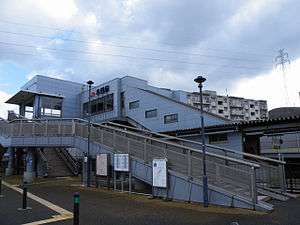Honjō Station (Fukuoka)
Honjō Station (本城駅, Honjō-eki) is a railway station on the Chikuhō Main Line (on the section also known as the Wakamatsu Line) in Yahatanishi-ku, Kitakyushu, Fukuoka Prefecture, Fukuoka Prefecture, Japan.[1]
Honjō Station 本城駅 | |
|---|---|
 Honjō Station in 2009 | |
| Location | 25-14 Rikimaru-machi, Yahatanishi, Kitakyushu, Fukuoka (福岡県北九州市八幡西区力丸町25-14) Japan |
| Coordinates | 33°52′30″N 130°43′22″E |
| Operated by | |
| Line(s) | ■ Chikuhō Main Line |
| Distance | 9.3 km from Wakamatsu |
| Platforms | 1 island platform |
| Tracks | 2 |
| Construction | |
| Structure type | At grade |
| Bicycle facilities | Bike shed |
| Disabled access | Yes - elevators serve hashigami station |
| Other information | |
| Status | Remotely managed station |
| Website | Official website |
| History | |
| Opened | 15 March 2003 |
| Traffic | |
| Passengers (FY2016) | 1,290 daily |
| Rank | 134th (among JR Kyushu stations) |
| Location | |
 Honjō Station Location within Japan | |
Lines
The station is served by the Chikuhō Main Line and is located 9.3 km from the starting point of the line at Wakamatsu.[2]
Station layout
The station consists of an island platform serving two tracks. The station building is a hashigami structure where the passenger facilities (a waiting room, automatic ticket vending machines and ticket gates) are located on the second level on a bridge which links to the platform. The bridge also serves as a pedestrian crossing, linking the streets on both sides of the tracks. Access to the second level of the hashigami structure is by flights of steps or elevators. A bike shed is provided outside the station.[2][3][4]
Station layout
| 1 | ■ Chikuhō Main Line | for Futajima and Wakamatsu |
| 2 | ■ Chikuhō Main Line | for Orio, Nakama, and Nōgata |
History
The station was opened by JR Kyushu on 15 March 2003 as an additional station on the existing Chikuhō Main Line track.[2]
On 4 March 2017, Honjō, along with several other stations on the line, became a remotely managed "Smart Support Station". Under this scheme, although the station is unstaffed, passengers using the automatic ticket vending machines or ticket gates can receive assistance via intercom from staff at a central support centre which is located at Nakama.[5]
Passenger statistics
In fiscal 2016, the station was used by an average of 1,290 passengers daily (boarding passengers only), and it ranked 134th among the busiest stations of JR Kyushu.[6]
Surrounding area
The station is surrounded by city-owned danchi apartment blocks. National Route 199 lies immediately northwest of the station. Other points of interest include:
- Honjō Athletic Stadium - 2 km northeast
- University of Occupational and Environmental Health Japan - 1 km northwest
- Kitakyushu Science and Research Park - 3 km north
The nearest bus stops for Kitakyushu City Buses are each approximately 500 meters from the north exit.
- Rikimaru-machi (力丸町), located northeast of the station
- Ōura-Itchōme (大浦1丁目), located southwest of the station
There is also a taxi stand outside the station's north exit.
References
- "JR Kyushu Route Map" (PDF). JR Kyushu. Retrieved 3 March 2018.
- Kawashima, Ryōzō (2013). 図説: 日本の鉄道 四国・九州ライン 全線・全駅・全配線・第3巻 北九州 筑豊 エリア [Japan Railways Illustrated. Shikoku and Kyushu. All lines, all stations, all track layouts. Volume 3 Kyushu Chikuhō area] (in Japanese). Kodansha. pp. 20, 73. ISBN 9784062951623.
- "本城" [Honjō]. hacchi-no-he.net. Retrieved 3 March 2018.
- "本城駅に訪問" [Visit to Honjō Station]. Dridorichi's railroad blog. 16 February 2018. Retrieved 3 March 2018. Provides photographic coverage of station facilities.
- "筑豊本線の一部が「Smart Support Station」に変わります" [Part of the Chikuho Line to become "Smart Support Stations"] (PDF). JR Kyushu. 3 February 2017. Retrieved 2 March 2018.
- "駅別乗車人員上位300駅(平成28年度)" [Passengers embarking by station - Top 300 stations (Fiscal 2016)] (PDF). JR Kyushu. 31 July 2017. Archived from the original (PDF) on 1 August 2017. Retrieved 3 March 2018.
| Wikimedia Commons has media related to Honjō Station (Fukuoka). |
External links
- Honjō (JR Kyushu)(in Japanese)